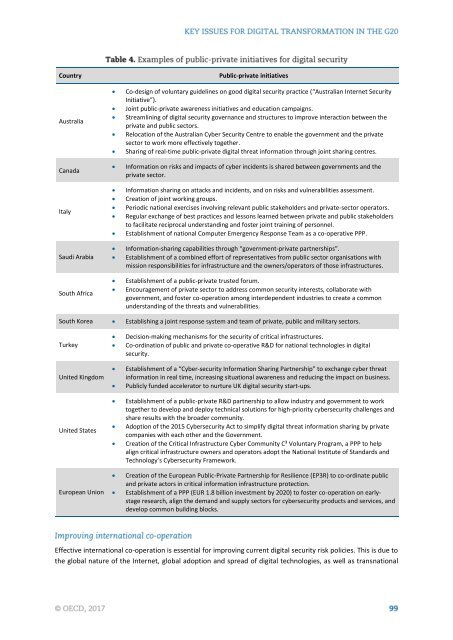KEY ISSUES FOR DIGITAL TRANSFORMATION IN THE G20
2jz0oUm
2jz0oUm
Create successful ePaper yourself
Turn your PDF publications into a flip-book with our unique Google optimized e-Paper software.
Country<br />
Australia<br />
Canada<br />
Italy<br />
Saudi Arabia<br />
South Africa<br />
<br />
<br />
<br />
<br />
<br />
<br />
<br />
<br />
<br />
<br />
<br />
<br />
<br />
<br />
<br />
Public-private initiatives<br />
Co-design of voluntary guidelines on good digital security practice (“Australian Internet Security<br />
Initiative”).<br />
Joint public-private awareness initiatives and education campaigns.<br />
Streamlining of digital security governance and structures to improve interaction between the<br />
private and public sectors.<br />
Relocation of the Australian Cyber Security Centre to enable the government and the private<br />
sector to work more effectively together.<br />
Sharing of real-time public-private digital threat information through joint sharing centres.<br />
Information on risks and impacts of cyber incidents is shared between governments and the<br />
private sector.<br />
Information sharing on attacks and incidents, and on risks and vulnerabilities assessment.<br />
Creation of joint working groups.<br />
Periodic national exercises involving relevant public stakeholders and private-sector operators.<br />
Regular exchange of best practices and lessons learned between private and public stakeholders<br />
to facilitate reciprocal understanding and foster joint training of personnel.<br />
Establishment of national Computer Emergency Response Team as a co-operative PPP.<br />
Information-sharing capabilities through “government-private partnerships”.<br />
Establishment of a combined effort of representatives from public sector organisations with<br />
mission responsibilities for infrastructure and the owners/operators of those infrastructures.<br />
Establishment of a public-private trusted forum.<br />
Encouragement of private sector to address common security interests, collaborate with<br />
government, and foster co-operation among interdependent industries to create a common<br />
understanding of the threats and vulnerabilities.<br />
South Korea Establishing a joint response system and team of private, public and military sectors.<br />
Turkey<br />
United Kingdom<br />
United States<br />
European Union<br />
<br />
<br />
<br />
<br />
<br />
<br />
<br />
<br />
<br />
Decision-making mechanisms for the security of critical infrastructures.<br />
Co-ordination of public and private co-operative R&D for national technologies in digital<br />
security.<br />
Establishment of a “Cyber-security Information Sharing Partnership” to exchange cyber threat<br />
information in real time, increasing situational awareness and reducing the impact on business.<br />
Publicly funded accelerator to nurture UK digital security start-ups.<br />
Establishment of a public-private R&D partnership to allow industry and government to work<br />
together to develop and deploy technical solutions for high-priority cybersecurity challenges and<br />
share results with the broader community.<br />
Adoption of the 2015 Cybersecurity Act to simplify digital threat information sharing by private<br />
companies with each other and the Government.<br />
Creation of the Critical Infrastructure Cyber Community C³ Voluntary Program, a PPP to help<br />
align critical infrastructure owners and operators adopt the National Institute of Standards and<br />
Technology’s Cybersecurity Framework.<br />
Creation of the European Public-Private Partnership for Resilience (EP3R) to co-ordinate public<br />
and private actors in critical information infrastructure protection.<br />
Establishment of a PPP (EUR 1.8 billion investment by 2020) to foster co-operation on earlystage<br />
research, align the demand and supply sectors for cybersecurity products and services, and<br />
develop common building blocks.<br />
Effective international co-operation is essential for improving current digital security risk policies. This is due to<br />
the global nature of the Internet, global adoption and spread of digital technologies, as well as transnational


